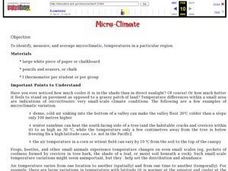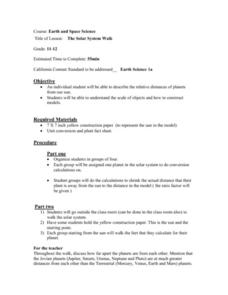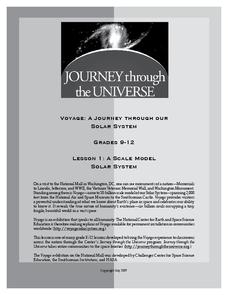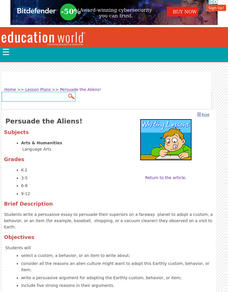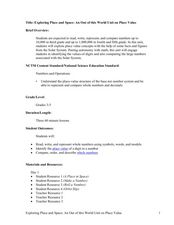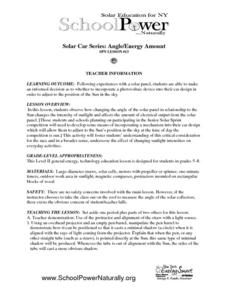Curated OER
Can Photosynthesis Occur at Saturn?
Students identify the different requirements for photosynthesis to take place. In this space science instructional activity, students simulate conditions in Saturn to investigate if photosynthesis is possible there. They use data and...
Curated OER
Recycling Survey
How many people really recycle recyclables and how do they feel about it? High schoolers create a survey to find out. Once they agree on what questions to include, they each interview four people outside of the classroom. They combine...
Curated OER
Micro-Climate
Atmosphere aces investigate the microclimates that exist within a larger area. They use a thermometer to record the varying temperatures and identify the microclimates on a map that they have drawn. This exercise helps them to understand...
Curated OER
The Planet Earth
Learners explore the planet Earth, outer space, and Earth's axis. They demonstrate reading comprehension skills, including literal meaning, inference and critical analysis.
Curated OER
Ecosystem Organization - Lesson Plan
Student explore ecosystems. In this ecosystem organization lesson, pupils consider how scientists study living organisms. Students participate in a teacher guided activity that requires them to visualize an organism and imagine its place...
Curated OER
The Undiscovered Planet
Learners find a planetary object using star fields. In this investigative lesson students determine the distance to an object using trigonometric parallax.
Curated OER
Terrabagga Activity Using a Magnetometer
Clever! Earth science learners construct a model of a planet containing a magnetic core. The planet, Terrabagga, is made out of a paper grocery bag, magnets, a dead D battery, and rubber bands. Pictures of each step of the construction...
Curated OER
The Solar System Walk
A unique lesson on the solar system, and some of the mathematics associated with it, is here for your high schoolers. Pupils are put into groups of four, and each group is assigned one of the planets from our solar system. They must...
Laboratory for Atmospheric and Space Physics
Looking to the Future
New Horizons set forth on a mission to Pluto in 2006. Ten years later, the spacecraft is still on its way. Here, enthusiastic scholars predict what they will be like—likes, dislikes, hobbies, etc.—when New Horizons arrives at its...
Curated OER
Exploring Scale And Ratio
Students measure the actual size and distance of the solar system using scale and ratio. They watch and discuss a video, create a distance-scale solar system model, and compare the scale sizes of planets to their actual sizes.
Curated OER
THAT'S WHY THEY CALL IT SPACE
Ninth graders set up a scale model of the solar system using the same scale for distance and diameter. They calculate scale distances and sizes for modeling the solar system and relate actual distances to difficulties in discovering and...
Curated OER
Comprehension: Compare and Contrast Topics in Two Texts
A scripted lesson can be a big help for new teachers. This fully scripted three-day learning activity provides teachers with the means to demonstrate how to compare and contrast two topics in two texts. Learners will work as a class to...
Journey Through the Universe
A Scale Model Solar System
Between the time scientists discovered Pluto and reclassified it as a dwarf planet, it did not even make one full revolution around the sun. In two activities, scholars investigate scale models and their properties. Pupils find that it...
Curated OER
SIZING UP SOL
Ninth graders produce a projected, pinhole image of the sun and from measurement of the image and projection distance, calculate the actual size of the sun. They estimate the sun's apparent brightness from different planet.
Curated OER
Persuade the Aliens!
Why do we do what we do? Imagine that people on a faraway planet came to visit Earth. Could you convince them to adopt a custom or behavior that we participate in here? Learners of all ages write persuasive essays. If you're using this...
Curated OER
Sand Travels
Students examine how sand is formed by erosion and that it can be moved by streams, rivers, and ocean currents in this unit of lessons. They study waves and currents, and structures that change how sand moves by creating story charts,...
California Academy of Science
Rapid Brainstorming: How Can We Improve Our Global Food System?
In 2018, the average fast food burger cost $2.64 while a salad averaged $4.14. Does the price difference matter to public health? Scholars consider that question and others in a brainstorming session about improving our global food...
California Academy of Science
Exploring the Impacts of Feeding the World
Approximately 50 percent of people in the world who are chronically hungry work in agriculture. While it seems counter-intuitive, the farther you live from a farm, the more food options are available. Scholars explore concepts related to...
Curated OER
Exploring Place and Space
Students explore number values by completing mathematical worksheets in class. In this decimals lesson, students identify the different place values a number has and the use of decimals to represent a fraction of a number. Students...
NASA
Exploring Data
Bring the sun to your class! Young scholars analyze actual solar wind data in the second lesson of a five-part series. Their analysis includes speed, temperature, and density data.
Curated OER
Solar Car Series: Angle/Energy Amount
Does the angle of a solar panel change the output? Emerging engineers find out! Demonstrate for your class how they can angle a straw to match the angle of light rays coming from a source. Then turn them loose to experiment with the...
Curated OER
Comet Myths, Facts, and Legends
Here is an interactive book lesson through which learners explore the facts and stories about comets. The plan is comprehensive, providing background information, standards met, vocabulary, assessment ideas, and more. Though the content...
NASA
Rover Races
Operating a vehicle remotely can be difficult, especially when the vehicle is on another planet. Young engineers get a feel for some of the real-world challenges as they work to program their rovers (blindfolded group members) through an...
S2tem Centers SC
Seasons
Winter, spring, summer, and fall—take the learning of the seasons beyond the elementary level to the middle school classroom. Curious learners begin by watching videos about the seasons and the rotation of planet Earth. Then, they...
Other popular searches
- Lesson Planet Lo Gin
- My Lesson Planet
- Planet Lesson Plans
- Google Planet Lesson Plans
- Lesson Planet Membership Fee
- Lesson planet.com
- Cost of Lesson Planet
- Lesson Planet Cost
- Creative Lesson Planet Earth
- Planets Lesson Plans
- Lesson Planet Home Page
- Lesson Planets Phone Number




